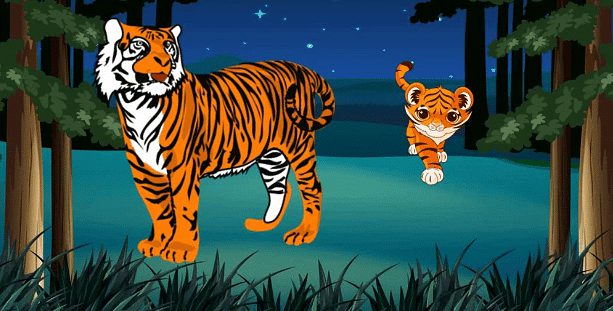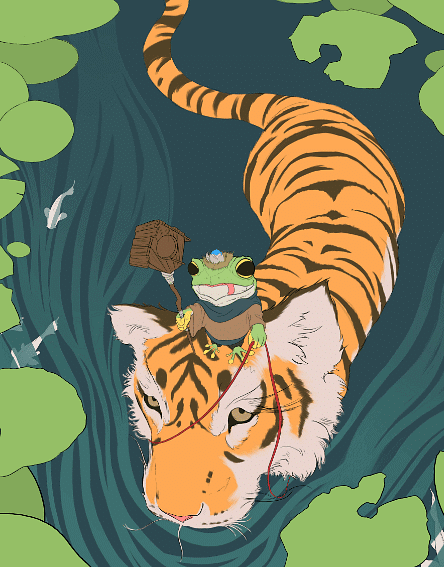Little Tiger, Big Tiger - 2 Class 3 Worksheet English Unit 7
 Q1: Multiple Choice Questions (MCQs)
Q1: Multiple Choice Questions (MCQs)
(i) What is the story primarily about?
(a) The life of a tiger cub
(b) The adventures of a mother tiger
(c) The travels of the author
(d) The jungle's dangers
Ans: (a)
The story primarily focuses on the journey of a tiger cub from its early days to becoming a strong adult.
(ii) Why did the mother tiger never allow her cub to go too far alone in the jungle?
(a) The cub didn't want to go far
(b) The cub was scared of the jungle
(c) The jungle was full of dangers
(d) The mother tiger was too strict
Ans: (c)
The mother tiger didn't allow the cub to go too far alone due to the dangers in the jungle.
(iii) What did the cub encounter when he went too far away chasing a frog?
(a) Another tiger bigger than his mother
(b) A friendly deer
(c) A river
(d) His father
Ans: (a)
The cub encountered a larger tiger when he strayed too far from his mother.
(iv) How did the mother tiger react when she saw her cub in danger?
(a) She scolded him
(b) She ignored him
(c) She roared and saved him
(d) She ran away
Ans: (c)
The mother tiger roared and saved her cub when he was in danger.
(v) What did the tiger do when he grew into a strong adult?
(a) He roamed the forests alone
(b) He never left his mother
(c) He became friends with other animals
(d) He stayed in one place
Ans: (a)
The tiger cub, when grown, roamed the forests alone.
Q2: True/False Statements
(i) The mother tiger allowed her cub to go far into the jungle.
Ans: False
(ii) The mother tiger was strict and harsh with her cub.
Ans: False
(iii) The cub encountered a larger tiger when chasing a frog.
Ans: True
(iv) The tiger cub was never able to grow into a strong adult.
Ans: False
(v) The author, Lois Hamilton Fuller, primarily wrote for adults.
Ans: False

Q3: Fill in the Blanks
(i) The story is primarily about the journey of a tiger cub from a _______ to a big, strong animal.
Ans: cub
(ii) The mother tiger never allowed the cub to go too far alone in the jungle due to the jungle's __________.
Ans: dangers
(iii) The cub went too far away chasing a ______ when he encountered a different, larger tiger.
Ans: frog
(iv) With time, the tiger cub grew into a big, strong animal and roamed the forests _______.
Ans: alone
(v) Lois Hamilton Fuller wrote the chapter during her time in _______.
Ans: India
Q4: Answer the following Questions
(i) Why did the mother tiger never allow her cub to go too far alone in the jungle?
Ans: The mother tiger never allowed her cub to go too far alone in the jungle because the jungle was full of dangers, and she wanted to protect her cub from potential threats.
(ii) What did the tiger cub encounter when he went too far away chasing a frog?
Ans: The tiger cub encountered a different tiger, bigger than his mother, when he went too far away chasing a frog. This encounter put him in danger, but his mother roared and saved him.
(iii) What did the tiger cub do as he grew into a big, strong animal?
Ans: As the tiger cub grew into a big, strong animal, he roamed the forests alone and proudly roared to assert his presence. Other animals feared him and kept their distance.
(iv) Who is the author of the story, and where did she write the chapter we are discussing?
Ans: The author of the story is Lois Hamilton Fuller. She wrote the chapter during her time in India. Lois Hamilton Fuller was an English writer who primarily wrote for children.
|
51 videos|346 docs|72 tests
|
FAQs on Little Tiger, Big Tiger - 2 Class 3 Worksheet English Unit 7
| 1. What is the difference between a puppy and a little tiger? |  |
| 2. How big can a little tiger grow? |  |
| 3. Can puppies and little tigers be kept as pets? |  |
| 4. What are some similarities between puppies and little tigers? |  |
| 5. How long do puppies and little tigers stay with their mothers? |  |





















